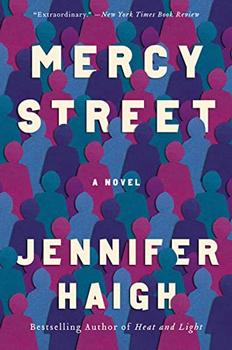Summary | Excerpt | Reading Guide | Reviews | Beyond the book | Read-Alikes | Genres & Themes | Author Bio

Every now and then the publishing industry gushes about a young author destined to become the next sensation in literary circles. Hardened cynics like yours truly invariably roll their eyes and try to take the adulation with a pinch of salt. I am embarrassed to admit that I had not read any of Brit Bennett's perceptive essays about race before I finished her incredibly brilliant, sage and moving debut novel, The Mothers. But now that I have read almost all her work, I am here to tell you: this phenom is the real thing.
The titular Mothers are a group of older African American women whose sole succor is Upper Room, a black church in Oceanside, a satellite of San Diego. Having being battered down by years of institutionalized racism, they have now retreated to the quiet refuge of Upper Room to live out their last days and to wring their collective hands or gossip over the young 'uns in the flock: "We tried to love the world. We cleaned after this world, scrubbed its hospital floors and ironed its shirts, sweated in its kitchens and spooned school lunches, cared for its sick and nursed its babies. But the world didn't want us, so we left and gave our love to Upper Room."
Prime among the Mothers' concerns is 17-year-old Nadia, a black high school senior with infinite promise caught in the throes of grief after her young mother commits suicide. Her supportive but reticent dad notwithstanding, Nadia can't find the ground beneath her feet, but she discovers a measure of escape in Luke Sheppard, Upper Room's pastor's son. Just a couple of years older than Nadia, Luke's promising career in football – and university scholarship – was cut short after a devastating leg injury. Nadia's classmate, and church faithful Aubrey Evans, nurses her own psychological injuries. The three young characters weave in and out of each other's lives in a complex and tangled web of friendship and secrets that Bennett teases apart with subtlety and a wisdom far beyond her 26 years.
Early on, Nadia's dalliances with Luke leads to pregnancy and then she becomes "unpregnant," undergoes an abortion. Having been granted a prestigious scholarship to attend college at the University of Michigan, Nadia is convinced about her decision: "She couldn't let this baby nail her life in place when she'd just been given a chance to escape."
This is not a plot spoiler. In fact, much of the story focuses on the effects from this singular, carefully deliberated decision that will reverberate over many years and wrap the characters in an unknowable and suffocating grip. Mothers and motherhood form the scaffolding of this emotionally pithy novel and Bennett's superlative gifts are visible in her nuanced handling of issues that are ripe for histrionics and melodrama. There's Nadia's motherhood cut short of course, but Bennett searingly places Nadia's story squarely in the womb of her mother's ultimate abandonment. Nadia is devastated by her mom's suicide and is convinced that she was the root cause of it: "Sometimes I wonder...If my mom had gotten rid of me, would she still be alive? Maybe she would've been happier. She could've had a life." It is difficult to overstate the depth of guilt burrowed deep in Nadia, it's a lurking monster that overshadows practically every major decision she makes. Then there are the collective Mothers who might care but also suffocate Nadia with their passive-aggressive manipulation and petty gossip.
Even in faraway Michigan, Nadia finds she can't escape family, community, Oceanside. "Grief was not a line, carrying you infinitely further from loss. You never knew when you would be sling-shot backward into its grip." When she eventually returns years later to tend to her ailing father, she is promptly sucked back into a complex whirlpool of emotions spiked with jealousy, rivalry, and tempered by nostalgia.
Bennett superbly dusts each character's life with the central motherhood theme, blended in so expertly that it is never jarring. Her decision to alternate the young characters' stories with a chorus of the elder mothers' voices in second person, allows the "kids" time to grow into their more mature skins against the larger canvas of the omnipresent mothers' concerns.
Bennett, who started work on The Mothers nine years ago when she was seventeen, walks a high-wire act: treading complicated story arcs, maturing characters and voice and tone with impressive panache. I can't wait to see this young author's career ripen and evolve and see what she comes up with next.
Believe the hype. Read this book. Be prepared to be floored.
![]() This review was originally published in The BookBrowse Review in October 2016, and has been updated for the
October 2017 edition.
Click here to go to this issue.
This review was originally published in The BookBrowse Review in October 2016, and has been updated for the
October 2017 edition.
Click here to go to this issue.

If you liked The Mothers, try these:

by Camilla Barnes
Published 2025
An often hilarious, surprisingly moving portrait of a long-married couple, seen through the eyes of their wickedly observant daughter—for fans of A Man Called Ove and The Royal Tenenbaums.

by Jennifer Haigh
Published 2023
The highly praised, "extraordinary" (New York Times Book Review) novel about the disparate lives that intersect at a women's clinic in Boston, by New York Times bestselling author Jennifer Haigh
Analyzing humor is like dissecting a frog. Few people are interested and the frog dies of it.
Click Here to find out who said this, as well as discovering other famous literary quotes!
Your guide toexceptional books
BookBrowse seeks out and recommends the best in contemporary fiction and nonfiction—books that not only engage and entertain but also deepen our understanding of ourselves and the world around us.